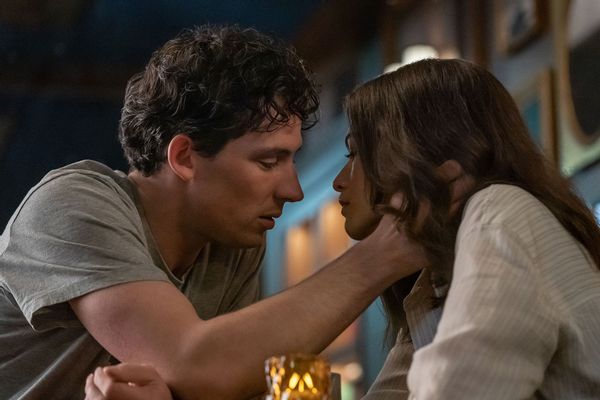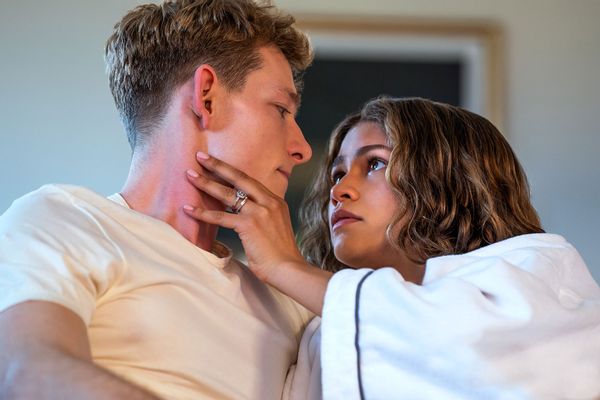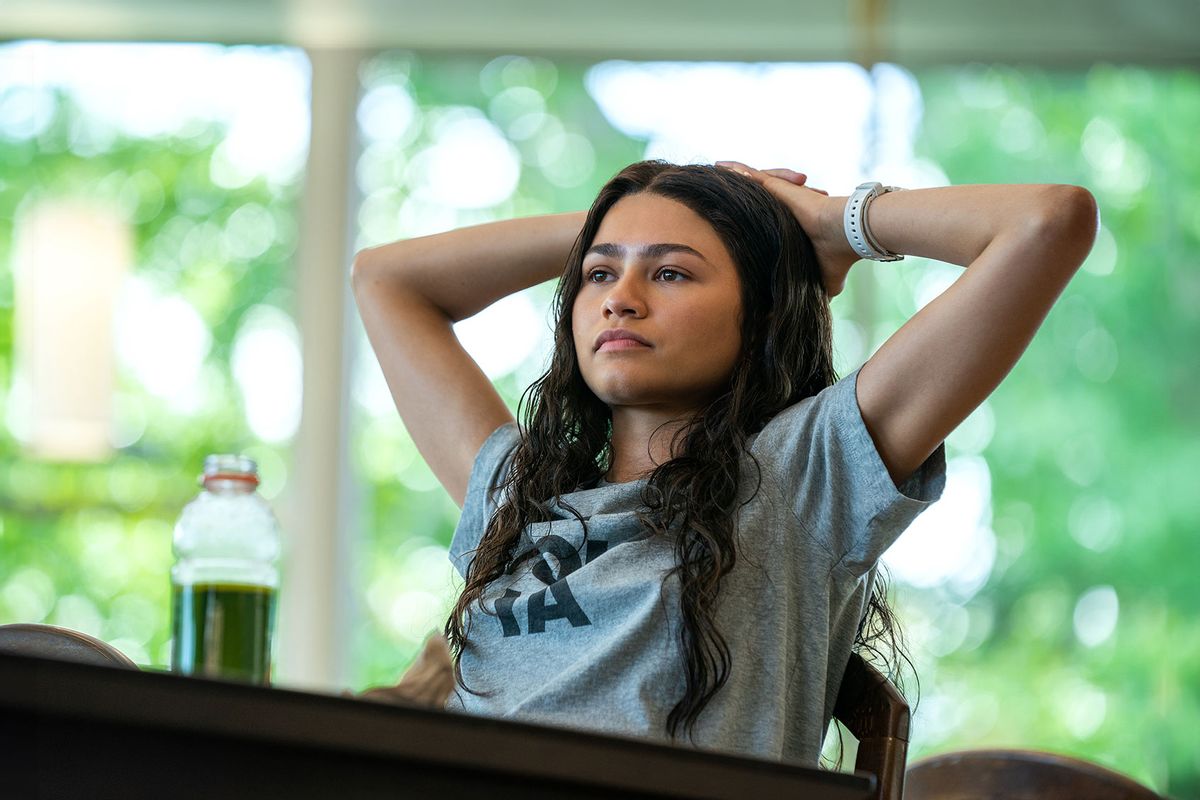Hair is personal. The memories of my Ethiopian mother meticulously washing, parting and braiding my hair on a Sunday evening after church are still ever present in my adult mind. My butt still stings from sitting on pillows, attempting to mask the hardwood floors of our living room while she would work for hours, crossing three strands of my curly, long hair. She'd repeat the steps over and over until each braid nearly looked like it was crafted by God's hands.
What "Challengers" misses with Tashi's hair is how it is used for the empowerment of Black women in tennis.
That's what hair means to Black women. We all have endless memories of getting our hair done and the people connected to it. This is why hair brings us a sense of community, empowerment and identity. It's a defining physical characteristic for most people but for some Black women, it's a way of life. Some of the most high-profile Black women also take great joy in the pageantry and transformation of their hair. Zendaya is one of those women with her ever-changing red carpet looks – even dyeing her hair for her different movies. She was sporting a new blonde 'do, promoting her new film "Challengers," and then switched it up for Monday's Met Gala.
"Challengers," directed by Luca Guadagnino and written by Justin Kuritzkes, centers on Tashi Duncan (Zendaya), a former tennis wunderkind turned pro-tennis coach for her husband Art Donaldson (Mike Faist), who's trajectory seems promising but is disillusioned with the sport. Their ascension hits a speedbump however when they are faced by her ex-boyfriend and Art's former best friend, burnout tennis player Patrick Zweig (Josh O'Connor), who's never lived up to his potential . . . until now, when the two men face off.
One of the more fascinating aspects of "Challengers" is the main characters' hair. Told through a non-linear timeline that oscillates between the past and present, the film uses different wigs, hairstyles and cuts to signify how time has passed for Tashi, Art and Patrick. But what "Challengers" misses with Tashi's hair is how it is used for the empowerment of Black women in tennis, namely the pioneers of sport like Venus and Serena Williams, gained from their distinct self-expression through their hair.
How did this happen? The script had originally been written to acknowledge the importance of Black women in the sport. When outlining Tashi's character, writer Kuritzkes said to Variety that as soon as he started writing, “Tashi was always a Black woman." He was inspired to write "Challengers" after watching the infamous 2018 U.S. Open match between Serena Williams and Naomi Osaka. He shared that it felt "ridiculous to create a love triangle set in the tennis world with three American players and not have one of them be a Black woman. Because that is the story of American women’s tennis, if you look at all of the big superstars from the past decade.”
 Josh O’Connor stars as Patrick and Zendaya as Tashi in "Challengers" (Niko Tavernise / Metro Goldwyn Mayer Pictures)However, not much is made of Tashi's Blackness in the film's storytelling nor dialogue . . . and even less so on the screen. She exists in a space where she clearly is inspired by the Williams sisters, even though she is not monoracial like them. She is biracial like Osaka, who is Japanese and Haitian. But there are no direct indications to her biracial identity other than seeing her Black father and white mother involved in her life. It is implied that she comes from a working-class background, and tennis is her ticket to making her and “her family millionaires.” Race only peeks through the film's white lens when former lovers Tashi and Patrick argue about their complicated relationship dynamics, and Tashi spits out with vitriol, “I’m taking such good care of my little white boys.”
Josh O’Connor stars as Patrick and Zendaya as Tashi in "Challengers" (Niko Tavernise / Metro Goldwyn Mayer Pictures)However, not much is made of Tashi's Blackness in the film's storytelling nor dialogue . . . and even less so on the screen. She exists in a space where she clearly is inspired by the Williams sisters, even though she is not monoracial like them. She is biracial like Osaka, who is Japanese and Haitian. But there are no direct indications to her biracial identity other than seeing her Black father and white mother involved in her life. It is implied that she comes from a working-class background, and tennis is her ticket to making her and “her family millionaires.” Race only peeks through the film's white lens when former lovers Tashi and Patrick argue about their complicated relationship dynamics, and Tashi spits out with vitriol, “I’m taking such good care of my little white boys.”
In an interview with Variety, Zendaya said in that contentious moment with Patrick, “It’s very clear to her that she’s coming into a place of privilege and access that she clearly didn’t grow up with, so she enjoys f**king with [Art and Patrick] about it."
Throughout the movie, Tashi's proximity to whiteness can be seen through the transformation in her hair. While the film tries to implement Tashi as a symbol of representation of past and current Black female tennis players, its white filmmakers and white hair and makeup team only emphasize her whiteness. Hair and makeup heads Massimo Gattabrusi and Fernanda Perez said they had modeled Tashi's hair to resemble white female tennis player Maria Sharapova — instead of the Williams sisters, Osaka or even young new star Coco Gauff.
In Tashi's case . . . the closer she gets to the privilege, access and proximity to whiteness, we see her outer state conform.
As a young rising star, Tashi begins the movie at 18 ready to take on college tennis at Stanford and become a breakout powerhouse. Her hair matches this with a long wavy, dense wig that gets interchanged with her game-day hair, a long, single, tight braid, which Gattabrusi called a "powerful hairdo." While Perez said they drew inspiration from many different tennis players, "But you can see the braid on Sharapova."
After Tashi's career-ending injury, she is in a new phase of life so Gattabrusi said she transitions to a mid-length wig which is looser than her already wavy textured hair. This transition is also where Art and Tashi's burgeoning professional and romantic relationship blossoms and deepens. Finally, in the present day, Art and Tashi are married and seen as a tennis power couple; she has adopted his last name, they have a daughter and her hair is no longer wavy. It is almost fully straightened and sports blonde highlights. "[It] makes her look more mature, more of a mother. And with a different kind of power," Gattabrusi said.
We need your help to stay independent
While it can be empowering for Black women to change their hairstyles, color and cut, in Tashi's case, inadvertently, the closer she gets to the privilege, access and proximity to whiteness, we see her outer state conform to an image of whiteness. Tashi has entered this new powerful phase in her life, wielding control over two white men and their tennis careers. In turn, she loses what made her a force to begin with — her authenticity.
 Mike Faist stars as Art and Zendaya as Tashi in "Challengers" (Niko Tavernise / Metro Goldwyn Mayer Pictures)This sense of authenticity is seen in the Williams sisters' most memorable hairstyles. From their historic jingling, white beaded braids, to brown microbraids, blonde braids, braid outs, weaves and leave-outs. They've done it all-natural, colorful and even pressed out. But they never lost their sense of self-discovery and expression on the court, especially as the first two Black women to break through a predominantly white sport.
Mike Faist stars as Art and Zendaya as Tashi in "Challengers" (Niko Tavernise / Metro Goldwyn Mayer Pictures)This sense of authenticity is seen in the Williams sisters' most memorable hairstyles. From their historic jingling, white beaded braids, to brown microbraids, blonde braids, braid outs, weaves and leave-outs. They've done it all-natural, colorful and even pressed out. But they never lost their sense of self-discovery and expression on the court, especially as the first two Black women to break through a predominantly white sport.
However, in this very same sport, Tashi never achieves the personal success, esteem and great heights the Williams sisters, Osaka and Guaff have garnered in their careers. It leaves her greedily craving power like it is her life force, one that she drains from her "little white boys” who are drunkenly in love with her. While "Challengers" tries to convince us that Tashi has control and is empowered through her hair, especially her final, blonde straight bob look, it actually depicts that she is experiencing the opposite. She is a woman so desperately trying to gain control, or at least hold onto it — all the while losing what makes her her in the process.
Read more
about Black women in sports



Shares